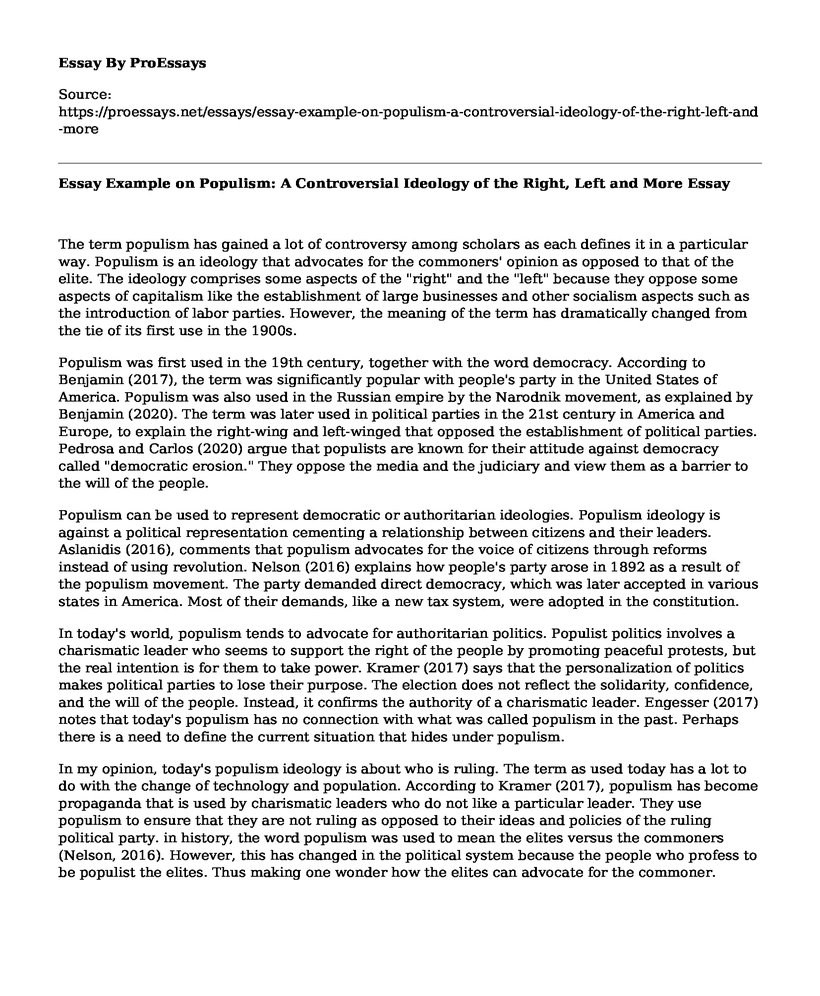The term populism has gained a lot of controversy among scholars as each defines it in a particular way. Populism is an ideology that advocates for the commoners' opinion as opposed to that of the elite. The ideology comprises some aspects of the "right" and the "left" because they oppose some aspects of capitalism like the establishment of large businesses and other socialism aspects such as the introduction of labor parties. However, the meaning of the term has dramatically changed from the tie of its first use in the 1900s.
Populism was first used in the 19th century, together with the word democracy. According to Benjamin (2017), the term was significantly popular with people's party in the United States of America. Populism was also used in the Russian empire by the Narodnik movement, as explained by Benjamin (2020). The term was later used in political parties in the 21st century in America and Europe, to explain the right-wing and left-winged that opposed the establishment of political parties. Pedrosa and Carlos (2020) argue that populists are known for their attitude against democracy called "democratic erosion." They oppose the media and the judiciary and view them as a barrier to the will of the people.
Populism can be used to represent democratic or authoritarian ideologies. Populism ideology is against a political representation cementing a relationship between citizens and their leaders. Aslanidis (2016), comments that populism advocates for the voice of citizens through reforms instead of using revolution. Nelson (2016) explains how people's party arose in 1892 as a result of the populism movement. The party demanded direct democracy, which was later accepted in various states in America. Most of their demands, like a new tax system, were adopted in the constitution.
In today's world, populism tends to advocate for authoritarian politics. Populist politics involves a charismatic leader who seems to support the right of the people by promoting peaceful protests, but the real intention is for them to take power. Kramer (2017) says that the personalization of politics makes political parties to lose their purpose. The election does not reflect the solidarity, confidence, and the will of the people. Instead, it confirms the authority of a charismatic leader. Engesser (2017) notes that today's populism has no connection with what was called populism in the past. Perhaps there is a need to define the current situation that hides under populism.
In my opinion, today's populism ideology is about who is ruling. The term as used today has a lot to do with the change of technology and population. According to Kramer (2017), populism has become propaganda that is used by charismatic leaders who do not like a particular leader. They use populism to ensure that they are not ruling as opposed to their ideas and policies of the ruling political party. in history, the word populism was used to mean the elites versus the commoners (Nelson, 2016). However, this has changed in the political system because the people who profess to be populist the elites. Thus making one wonder how the elites can advocate for the commoner.
Conclusion
In summary, the paper has defined the word populism, its history, and its effect in the current society. Populism is an ideology that advocates for the voice of the commoner as opposed to that of the elite. The origin of populism can be traced back to the 19th century in Russia and America. Today's definition of populism differs widely with the original meaning of the term.
Works cited
Aslanidis, Paris. "Is populism an ideology? A refutation and a new perspective." Political Studies 64.1_suppl (2016): 88-104.
de las Heras-Pedrosa, Carlos, et al. "Populism and Independence Movements in Europe: The Catalan-Spanish Case." Social Sciences 9.4 (2020): 1-20.
Engesser, Sven, et al. "Populism and social media: How politicians spread a fragmented ideology." Information, communication & society 20.8 (2017): 1109-1126.
Kramer, Benjamin. "Populist online practices: the function of the Internet in right-wing populism." Information, Communication & Society 20.9 (2017): 1293-1309.
Nelson, Cassandra. "Analyzing Populist Party Primary Documents." (2016).
Cite this page
Essay Example on Populism: A Controversial Ideology of the Right, Left and More. (2023, May 08). Retrieved from https://proessays.net/essays/essay-example-on-populism-a-controversial-ideology-of-the-right-left-and-more
If you are the original author of this essay and no longer wish to have it published on the ProEssays website, please click below to request its removal:
- Paper Example on Diversity, Democracy and Dissent
- A More Perfect Constitution Conceptual Paper
- Fisheries and Aquaculture Policy: Striking the Balance Essay
- After Watching Genocide Organ Essay Example
- Essay on the Balance Between Freedom & Governance: A Necessity for Society
- Essay Example on Caucus: A Time-Consuming Process for Registered Voters
- Paper Example on Social Capital: Examining its Role in Reproducing/Producing Inequality







